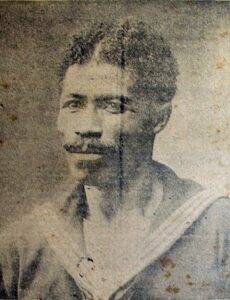
João Felisberto
*João Felisberto was born on this date in 1880. He was an Afro Brazilian sailor and activist.
João Cândido Felisberto was born in Encruzilhada do Sul, Rio Grande do Sul, to a poor Afro Brazilian family. His father and mother were former slaves. He entered the Brazilian Navy in 1894 at the age of 13. The conditions for Brazilian sailors at the time were harsh, and being Black, Felisberto suffered prejudice from the white officers in the Brazilian Navy. While experiencing Newcastle's living conditions and increased freedoms, Felisberto realized how unacceptable conditions were in the Brazilian Navy.
The sailors had many secret meetings in Rio de Janeiro, planning a strategy to stop the corporal punishment still imposed in the new Navy. In November 1910, the flogging of a sailor, against Navy regulations (250 strokes instead of the allowed 25 strokes), was a contributing factor to the 'Revolt of the Lash.' Sailors took control of two Brazilian battleships and two other major warships. Their demands included the abolition of torture as a form of punishment and improved living conditions in the Brazilian Navy. Felisberto was the leader of the movement.
The new Brazilian president, Hermes da Fonseca, promised the end of "Chibata," but the government later returned to this promise. In the revolt's aftermath, Felisberto and others were either arrested, tortured, or murdered in prison. Felisberto contracted tuberculosis, but he recovered and was eventually released. The Brazilian press nicknamed him "Almirante Negro" or the "Black Admiral" for his actions. After his release, he sank into poverty and experienced discrimination, working in a harbor on a meager salary. He was arrested again in 1930 but was soon released. In 1933, he joined the integralist movement. In 1938, an integralist uprising was quickly crushed by the Brazilian military, with fewer than twenty deaths, and the group was outlawed.
With Brazil at war with the fascist Axis powers from 1942 onwards, integralism became a small and powerless movement. Germany's defeat in 1945 reduced integralism to very little importance. João Cândido Felisberto said in 1968 that he was proud to be an integralist. After living in ostracism in the Brazilian city of São João de Meriti and being persecuted by the Brazilian Navy, João Felisberto, best known as the leader of the 1910 "Revolt of the Lash," died of cancer on December 6, 1969, in Rio de Janeiro, at the age of 89.
Legacy and statue
The Lash Uprising was cited later by labor organizers as a "heroic example of worker struggle." A statue of João Felisberto was erected in Rio de Janeiro. His life was portrayed in a movie, Memórias da Chibata 2006, retelling his fight against the Lash, a coproduction with Empresa Brasil de Comunicação, in 2010.